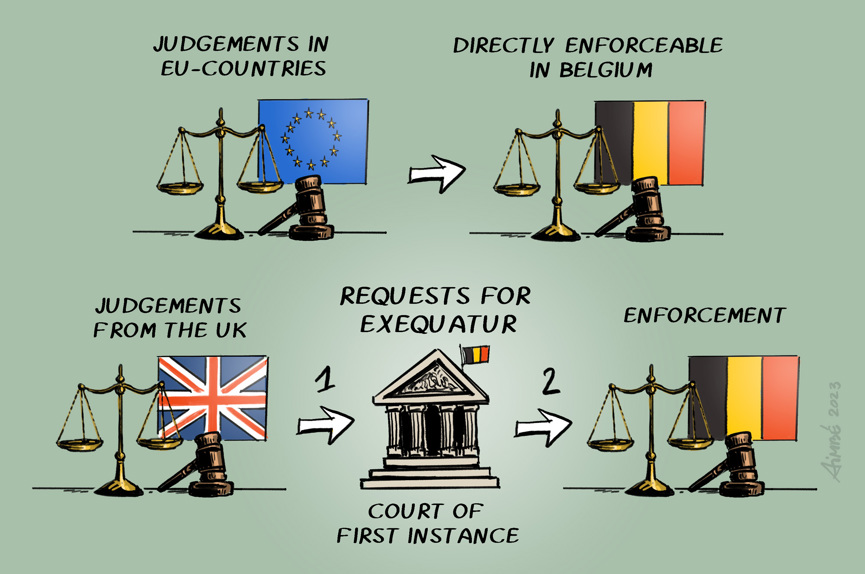- Litigation and Arbitration
- Roeland Moeyersons - Steve Griess
- foreign judgement , enforcement of foreign judgements , EU-judgements , exequatur , non EU-judgement , enforceable , official recognition , Brussels I bis Regulation , proceedings to obtain an exequatur , court order granting the exequatur
In Belgium different rules and formalities apply to the enforcement and recognition of foreign judgements based on the State in which the foreign judgement was entered (the State of origin).
Especially after the Brexit, this is a major concern.
For the purposes of this contribution, we will address the recognition and enforcement of foreign judgements in civil and commercial matters.

1. Overview
The main difference between the enforcement of EU versus non-EU judgements is that the former are enforceable as a matter of law.
For judgements rendered by courts of Member States of the European Union, Brussels I bis Regulation applies.
Conversely, non-EU judgements may only be enforced after a court order recognising the foreign judgement (or exequatur) has been obtained.
The proceedings to obtain an exequatur are based on a unilateral application. The court order granting the exequatur may be appealed within one month.
For judgements entered in non-EU countries, international conventions, bilateral conventions, or the Belgian Code on Private International Law l apply. Following the Brexit, the 1934 bilateral Convention for the Reciprocal Enforcement of Judgements between Belgium and the United Kingdom became relevant again.
The table below summarises the applicable regulations, conventions, or codes of law, for the enforcement of foreign judgements in Belgium.
| Legal basis for the enforcement | Countries to which it applies | Judicial procedures necessary for the enforcement | Specific elements |
| Brussels I bis Regulation | EU member states | None. Judgements are enforceable by law | |
| Lugano II Convention | EU / Iceland, Norway, Switzerland | Judgements are automatically recognised, but an exequatur is necessary for the enforcement | |
| The Hague Convention on Choice of Court Agreements | EU / Mexico – Montenegro – Singapore – UK | Judgements are automatically recognised, but an exequatur is necessary for the enforcement. | Limited to judgements based on a choice of court agreement. |
| Convention on the recognition and enforcement of foreign judgements in civil or commercial matters | EU / Ukraine | Judgements are automatically recognised, but an exequatur is necessary for the enforcement. | Enters into force on 1 September 2023. |
| The 1934 bilateral Convention for the Reciprocal Enforcement of Judgements between Belgium and the UK | Belgium / UK | Judgements are automatically recognised, but an exequatur is necessary for the enforcement. | Following the Brexit, this bilateral convention is back into force. |
| Code of Private International Law (CPIL) | Belgium / the rest of the world | Judgements are automatically recognised, but an exequatur is necessary for the enforcement. | Foreign judgements may not be reviewed on the merits. |
The court may refuse the recognition and enforcement of foreign judgements on a limited number of grounds.
These are mostly related to reasons of public policy, concerns with the defendant’s rights of defence, the foreign judgement being irreconcilable with another judgement entered in Belgium or with pending proceedings and (under the Code of Private International Law), evasion of the law applicable to the dispute or of the rules on (exclusive).
2. Competent Court
EU judgements: Not applicable.
Non-EU judgements: exequatur applications must be filed with the Court of First Instance of the domicile of the party against whom enforcement is sought, or of the place of enforcement.
3. Formal Requirements
EU judgements are enforceable in Belgium by simply providing a certified copy of the EU judgement accompanied by:
- a certificate from the court of the State of origin confirming that the judgement was entered in a civil or commercial matter (see Annex I to the Brussels I Bis Regulation);
- an official translation of the original judgement and the certificate if these are in a different language other than any of the three languages official in Belgium (i.e., French, German and Dutch).
Non-EU judgements require an official recognition known as exequatur. In general, and subject to the specific requirements under the relevant applicable convention, the following documents must be submitted to the Belgian court:
- a certified copy of the decision, which according to the law of the State where it was rendered, meets the conditions required for the authenticity thereof;
- if it concerns a decision by default, the original or a certified copy of the document establishing that the act that introduced the proceeding or the equivalent document was served or brought to the notice of the defaulting party in accordance with the law of the State where the decision was rendered;
- any document on the basis of which it can be established that, according to the law of the State where the decision was rendered, the decision is enforceable and has been served or brought to notice.
4. Timeline and duration of the procedure
EU judgements: Not applicable
Non-EU judgements: It takes one to two weeks to obtain an exequatur.
Should you have any questions regarding this matter, please do not hesitate to contact our specialists: +32 (0)2 747 40 07 or info@seeds.law.



